Transferts monétaires et mobilité humaine
Les transferts monétaires sont souvent utilisés lors de crises afin de répondre aux besoins des personnes migrantes. Dans cette page, vous trouverez des ressources sur les transferts monétaires et la migration.

La Croix-Rouge se prépare à fournir une aide humanitaire aux migrant·es de la caravane sur le point de quitter le Honduras pour le Guatemala.
©Johannes Chinchilla / FICR.
Conflits, crises économiques et catastrophes sont autant de raisons ayant contraint des personnes à fuir et à traverser des frontières dans des conditions éprouvantes et risquées, en quête de sécurité et de moyens de subsistance. En 2020, le nombre de personnes déplacées de force s’est envolé au niveau sans précédent de plus de 80 millions de personnes, soit près du double du nombre enregistré il y a une dizaine d’année. Cette tendance s’aggrave et les effets du changement climatique menacent de déplacer jusqu’à 200 millions de personnes d’ici 2050.
L’assistance monétaire est de plus en plus utilisée afin de répondre aux besoins des personnes en situation de déplacement. On y a eu recours à grande échelle dans différents contextes de migration, en Europe en 2015 jusqu’au Venezuela pour « los caminantes ». Elle a également été utilisée dans d’autres crises migratoires, notamment en Amérique centrale, au Sahel, en Méditerranée et dans la Corne de l’Afrique. L’assistance monétaire est à l’heure actuelle l’une des principales formes d’aide apportée aux populations déplacées en Ukraine et dans les pays voisins.
Il existe une myriade de perspectives et de définitions concernant le mot « migrant·e » et la façon dont les humanitaires doivent agir. C’est pourquoi nous ne choisissons pas une définition unique pour le moment, étant donné que les discussions sur l’assistance monétaire et la migration en sont encore à leurs prémices et que le langage évolue encore.
Documenter et partager les données probantes donnera lieu à des interventions plus efficaces. Cette page contient une sélection de ressources utiles concernant la migration et le recours à l’assistance monétaire. Elle sera mise à jour au fil des discussions ayant lieu dans les espaces humanitaires des transferts monétaires.
Priorités actuelles
Afin de contribuer aux progrès relatifs à cet enjeu, nous nous engageons à :
- soutenir la création de données probantes aux niveaux régional et mondial ;
- contribuer aux solutions pratiques visant à mettre en œuvre les transferts monétaires auprès des personnes migrantes ;
- organiser des discussions sur les enjeux majeurs basées sur des données probantes.
Contenu récent

How do Labels and Vouchers Shape Unconditional Cash Transfers? Experimental Evidence from Georgia
Report
We implemented a randomized control trial in Georgia to study how labels and food vouchers affect household expenditure among low-income recipients of unconditional cash transfers. Households were randomly assigned to receive only an unconditional cash transfer, a label indicating an amount intended for...

Cash Assistance for GBV Survivors Receiving Case Management in Indonesia
Case Study
In partnership with Johns Hopkins University, UNFPA conducted an evaluation study on cash assistance for GBV Survivors receiving Case Management in Indonesia. The evaluation study was conducted to understand the impact of the cash assistance on safety, health, and uptake of services of GBV survivors in...

Cash & Voucher Assistance to Reduce Child Labour: A case study from Save the Children in Egypt
Case Study
This infographic highlights the main findings and achievements of Save the Children CVA operations in Egypt between March 2023 and November 2023, which aimed to assess and highlight the impact that CVA has on child protection outcomes, with a specific focus on unaccompanied and separated refugee children...
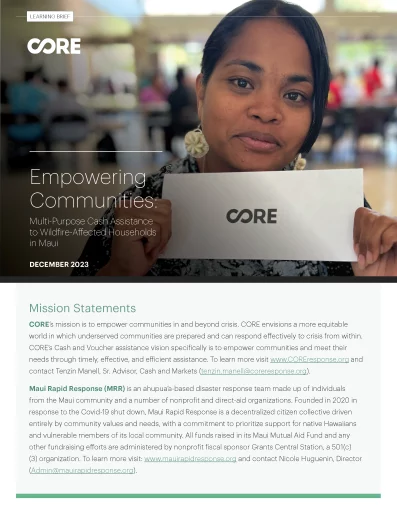
Empowering Communities: Multi-purpose cash assistance to wildfire-affected households in Maui
Case Study
On August 8, 2023, catastrophic wildfires in Maui County, Hawaii spread rapidly due to intense winds brought on by Hurricane Dora, devastating the town of Lahaina and causing widespread displacement across communities. It ranks as one of the 10 deadliest wildfires in US history since 1871 and the largest...

Cash & Voucher Assistance for Child Protection: A case study from Save the Children in Lithuania
Case Study
This infographic gathers key programmatic data from Save the Children CVA operations in Lithuania, within the larger context of the Ukrainian crisis, between December 2022 and April 2023, which aimed to assess and highlight the impact that CVA has on child protection outcomes, with a specific focus on...
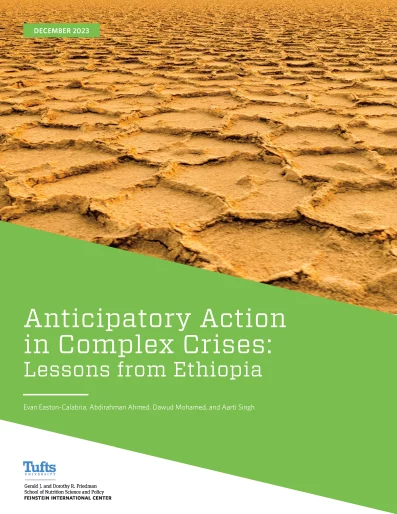
Anticipatory Action in Complex Crises: Lessons from Ethiopia
Case Study
While anticipatory action (AA) is commonly designed to address one specific hazard such as drought, many populations are experiencing repeated and multiple hazards and challenges. Given this, there is a need to understand how anticipatory action fits within the context of protracted and overlapping...

Impact Evaluation of Cash-Based Transfers on Food Security and Gender Equality in El Salvador
Case Study
1. Gender inequality is pervasive, particularly in developing countries such as El Salvador, and its potential welfare implications are concerning. In El Salvador, only 45.4 percent of women participate in the labour market, in contrast to 74.4 percent of men. 2. Economic development, gender equality in...

Understanding how Cash and Voucher Assistance Programs for Nutrition are Implemented: A review of programmatic case examples from Burkina Faso, Mali, Niger, Somalia, and Colombia
Report
The purpose of this review was to identify and document case examples of programs in different countries and contexts that use cash, vouchers, or in-kind food assistance with nutrition activities to understand why and how these programs are implemented, and identify innovations that may inform and support...
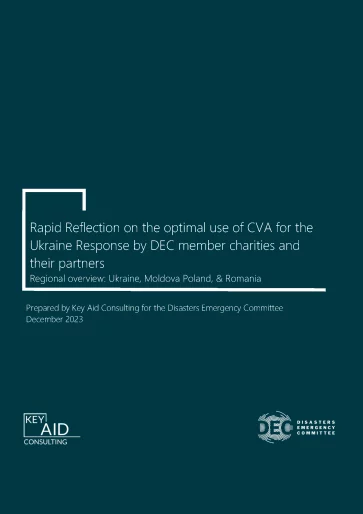
Rapid Reflection on the Optimal Use of CVA for the Ukraine Response by DEC Member Charities and their Partners
Report
Since February 2022, Ukraine and the neighbouring countries are facing a humanitarian crisis of unparalleled scale, ranking among the fastest-growing crises observed in the past decade and the largest in Europe since the end of World War II. In the first two months of conflict, more than 30 percent of...
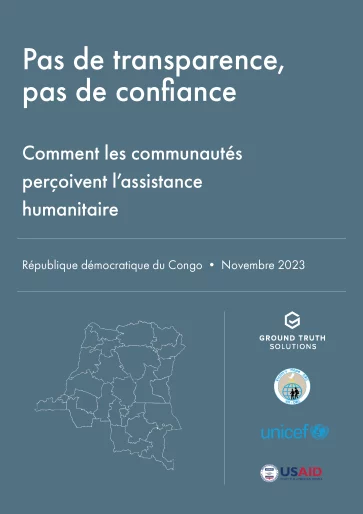
Pas de transparence, pas de confiance : comment les communautés perçoivent l’assistance humanitaire
Rapport
Réputée pour sa culture dynamique, sa diversité linguistique et ses importantes ressources naturelles, la République démocratique du Congo (RDC) fait honneur à son surnom de « cœur de l’Afrique ». Pourtant, malgré sa richesse culturelle et ses avantages géostratégiques, le pays détient...
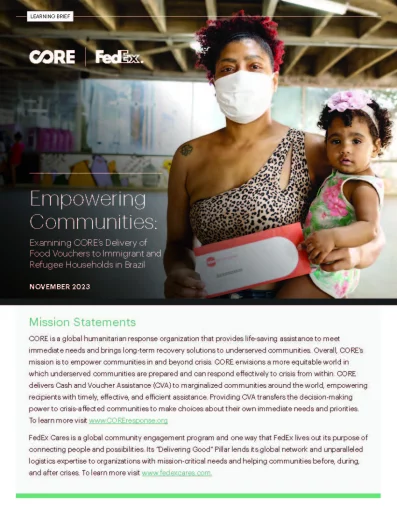
Empowering Communities: Examining CORE’s Delivery of Food Vouchers to Immigrant and Refugee Households in Brazil
Case Study
In 2022 alone Brazil hosted more than 560,000 refugees, asylum-seekers, stateless individuals and other individuals needing international protection. With year-on-year increase this trend is likely to continue. Although the government of Brazil does extend several protections to refugees—including...
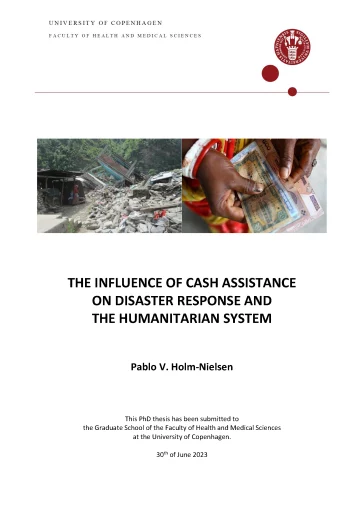
The Influence of Cash Assistance on Disaster Response and the Humanitarian System
Report
The research presented in this thesis is based on four studies that cover various aspects of the
transformative effect of CVA on humanitarian organizations and the humanitarian system. Study 1 shows the changes that the humanitarian organizations have experienced due to the shift to CVA. New skillsets...

Data Sharing in Humanitarian Cash and Voucher Assistance (CVA): A look at risks, threats and mitigation technologies
Report
This research, conducted by The Engine Room between March and October 2023, was commissioned by the Norwegian Refugee Council in collaboration with the DIGID consortium to map risks and threats related to data sharing in CVA, and to evaluate potential technological approaches that might mitigate these...
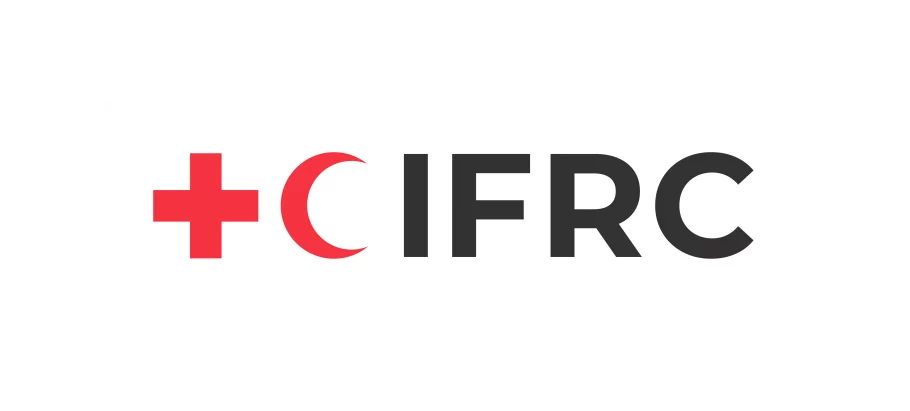
Risks and Threats related to data sharing in Humanitarian Cash and Voucher Assistance
Members event
As part of the DIGID Interoperability project looking at data interoperability in humanitarian cash and voucher assistance (CVA), The Engine Room recently concluded research into key risks and threats related to data sharing in CVA. This work included interviews with key people with relevant sectoral...
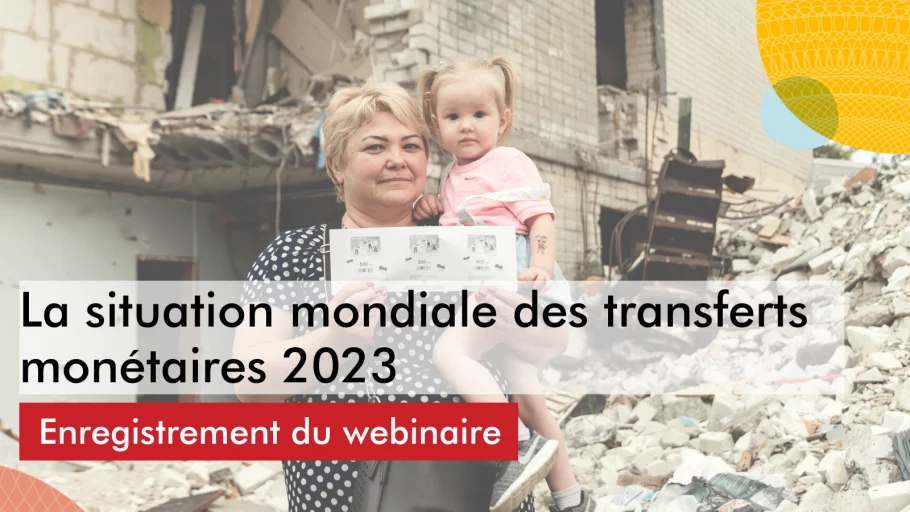
Lancement du rapport sur la situation mondiale des transferts monéaires 2023
Publication
Si vous avez manqué le lancement du rapport de CALP sur la situation mondiale des transferts monétaires 2023, voici un résumé de l’événement. Karen Peachey, directrice du CALP, a résumé les principales conclusions, les débats et les points saillants de ce rapport exhaustif qui représente une...

Joint Market Assessment Round 2
Report
This report assesses the feasibility of implementing Cash and Voucher Assistance (CVA), specifically Multipurpose Cash Assistance (MPCA), to support individuals impacted by the February 6 earthquakes. The evaluation focuses on the acceptance of various forms of cash modalities, availability of key items,...
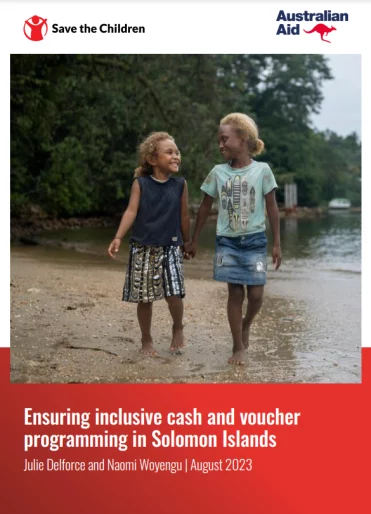
Ensuring Inclusive Cash and Voucher Programming in Solomon Islands
Report
Save the Children is expanding its cash and voucher programming in Solomon Islands; helping families to overcome financial barriers to improve outcomes for their children and advocating for investments in a national social protection system.
This report presents the findings of a Gender Equality,...
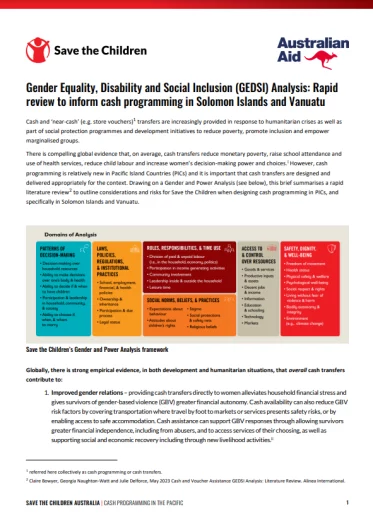
Gender Equality, Disability and Social Inclusion (GEDSI) Analysis: Rapid review to inform cash programming in Solomon Islands and Vanuatu
Report
There is compelling global evidence that, on average, cash transfers reduce monetary poverty, raise school attendance and use of health services, reduce child labour and increase women’s decision-making power and choices. Cash programming though, is relatively new in Pacific Island Countries (PICs) and...

Rapid Reflection on the Scale up of Cash Coordination- Türkiye/ Syria Earthquakes
Report
This rapid reflection piece looks at how cash coordination structures scaled up at the onset of the Türkiye/ Syria Earthquakes in February 2023. The short reports look at implications and good practices implemented by cash working groups in Türkiye, North West Syria, and Government-controlled areas of...

Cash and Voucher Assistance at Scale: Addressing food insecurity by supporting families in the Netherlands
Case Study
With an increasing number of families experiencing financial trouble in the Netherlands, in September 2022, the Dutch parliament voted to allocate €100 million for free school meals in vulnerable neighbourhoods across the country. After the proposal was approved, the Dutch Ministry of Education, Culture...


